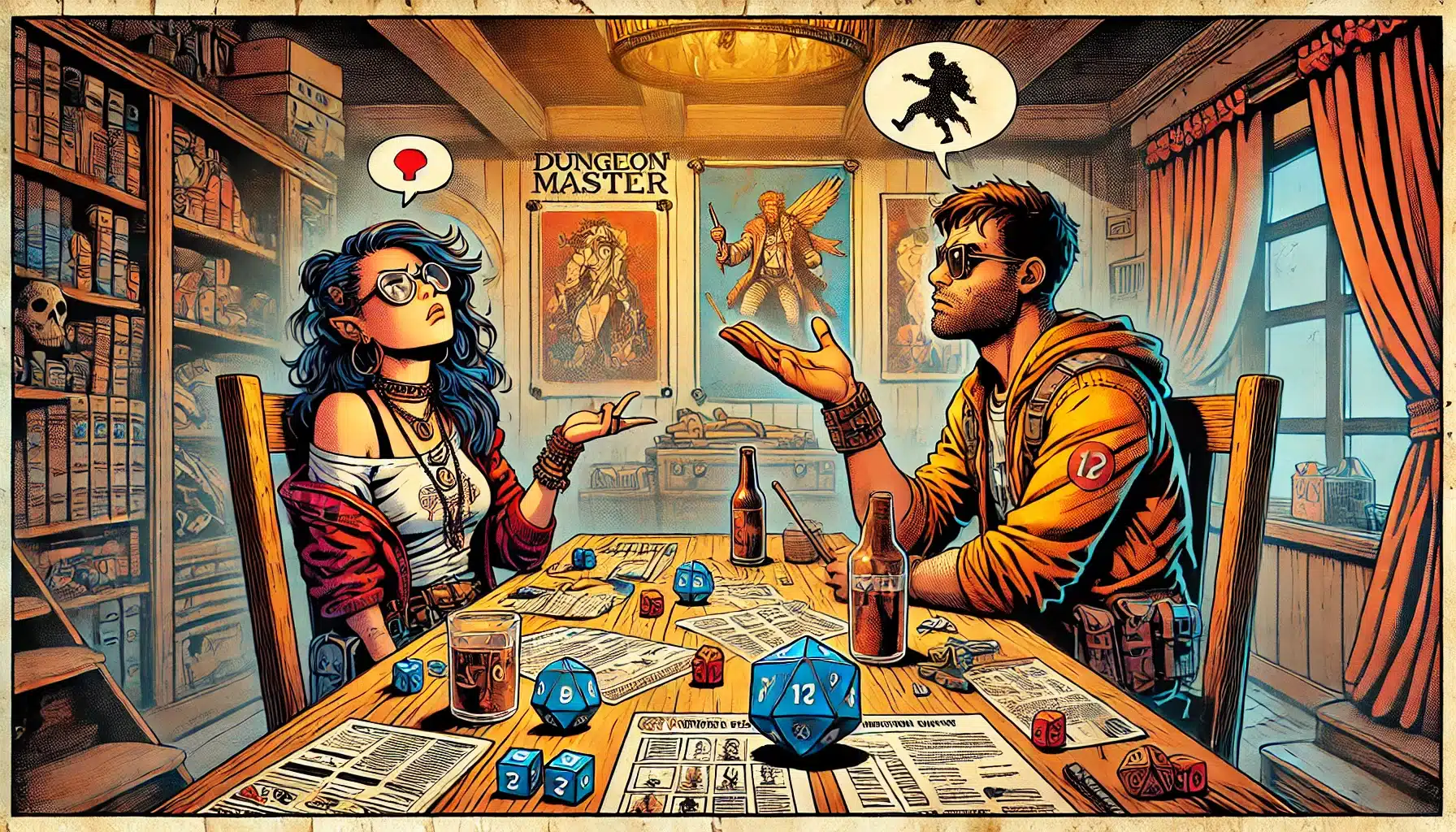Imagine sitting at a table surrounded by dice, character sheets, and a map sprawled with tiny figurines. At the helm sits the Dungeon Master, or DM, weaving a rich tapestry of adventure that brings the fantasy world to life. The DM is like a director, orchestrating the narrative flow while managing a myriad of tasks that keep the game exciting. But here’s the thing: while DMs embark on the demanding journey of constructing worlds, players have an essential role too. They need to ensure the game stays fun and manageable. Sometimes, unintentional habits can add stress rather than reduce it. This guide seeks to enlighten players on how they can assist their DM, making each gaming session a thrilling and enjoyable experience for all.
The role of a DM is complex. It’s a blend of creativity, strategic planning, and the ability to adapt at a moment’s notice. A DM crafts entire worlds from their imagination, populates them with vivid characters, and sets plots into motion—all while making infinity loops to accommodate the players’ unpredictable decisions. One moment they’re narrating a mysterious encounter in a haunted forest, and the next, they’re calculating the effects of a fireball in a tight dungeon corridor. It’s an ever-shifting balance of storytelling and mechanics.
Players are crucial in this dynamic, acting as the adventurers whose decisions push the narrative forward. And the essence of a good session lies not just in a DM’s preparation, but also in the players’ willingness to engage constructively. Many times, players unwittingly make a DM’s job harder. It might be as simple as not paying attention and missing key details, or it could be as disruptive as arguing rules mid-session. Each player’s actions contribute to the overall flow of the game.
Understanding what makes a DM tick and how to avoid common pitfalls can transform an average game night into an unforgettable journey. What follows is not just a manual but a partnership pact. When players recognize the judiciousness required to run a game and adjust their actions accordingly, they pave the way for a remarkable collaborative experience.
So, let’s delve into these intricacies: from embracing the nuances of the DM’s role to learning how best players can support their Tabletop Conductor. This is the path to ensuring your D&D campaign is as epic as it is enjoyable.
Understanding the DM’s Role and Challenges
The journey of a Dungeon Master begins with an idea—a spark of creativity that evolves into an entire universe. The mental and creative load of a DM is exhilarating yet demanding. It involves creating a world from scratch or adapting a pre-existing one, complete with lands, creatures, and cultures. Every session is a chapter in an ongoing story that the DM writes, edits, and performs on the fly.
Try my AI Tabletop RPG generators...and an extensive library of content!
Building intricate storylines is only a part of the job. The DM must also juggle combat encounters, ensuring they are balanced and engaging for the players. This requires a keen understanding of game mechanics and the ability to adjust on the spot. Imagine orchestrating a battle with multiple enemies while trying to maintain suspense and excitement—this is the reality of a DM during combat sessions.
Player arcs add another layer of complexity. Each player brings their character to life, with backstories and goals that the DM needs to weave into the main narrative. Keeping track of these individual stories while maintaining a coherent overarching plot is no easy feat. This responsibility demands organizational skills and improvisation.
And let’s talk about pacing. A DM must ensure the game flows smoothly, maintaining a rhythm that keeps players engaged. Too much downtime, and the excitement wanes. Rushed story beats can leave players feeling unsatisfied. Achieving this balance is art and science combined, requiring a perceptive understanding of the group’s dynamics.
Improvisation is perhaps the DM’s most remarkable skill. Players will often make unexpected choices that can derail the best-laid plans. A good DM rolls with these changes, adapting the story without losing momentum. This requires quick thinking and flexibility, attributes that are as necessary as creativity in maintaining the game’s intrigue.
⚔️ Fantasy RPG Random Tables Books
Make life as a Gamemaster easier…
If you play Dungeons & Dragons, Pathfinder, or other fantasy RPGs, this
RPG random tables series
is packed with encounters, NPCs, treasure, and more. Available in eBook or print—either way, you’ll have a wealth of adventure ideas at your fingertips.
What Makes a DM’s Job Difficult?
There is a multitude of tasks and challenges that can make a DM’s role incredibly demanding. Balancing the myriad elements of a game requires both meticulous preparation and the ability to adapt on-the-fly—skills honed over countless sessions. Let’s break down some of the most strenuous aspects of being a DM.
One of the most challenging tasks is managing multiple NPCs (non-player characters). Each is a character in its own right, with motivations, backstories, and personalities, all orchestrated by the DM. They must keep track of these characters’ interactions with the players and each other while maintaining consistency in the story.
Balancing encounters is another headache. Creating a combat scenario that is challenging yet fair can be tricky. The DM must keep engagement high without overwhelming or underwhelming the players, requiring a detailed understanding of the players’ characters and abilities.
Keeping players engaged during a session can be difficult, especially if the story doesn’t grip them immediately. A DM must read the room and adjust the narrative or pacing to maintain interest. This requires perceptiveness and improvisational skills, adding to the mental load.
Then there’s the issue of players derailing sessions, which can be surprisingly common. Sometimes players will pursue tangents or make unconventional choices that force the DM to abandon carefully prepared plans. While these moments can bring unexpected excitement, they also require agility from the DM.
Finally, rules lawyering and disputes over game mechanics can disrupt the flow of a session. When players argue or question a DM’s decision, it can stall the narrative and create tension. Navigating these situations requires diplomacy and often compromise.
Bullet List of Common Stressors for DMs:
- Players derailing sessions with unexpected decisions
- Managing a multitude of NPCs consistently
- Balancing combat encounters for fairness and fun
- Keeping players engaged with the story
- Handling rule disputes and game mechanics arguments
- Players ignoring key plot points
- Ensuring each player’s character arcs are acknowledged
- Maintaining story pacing without rushing or stalling
- Adapting to players’ unpredictable choices
- Scheduling games that fit everyone’s availability
- Maintaining continuity in the storyline
- Juggling in-game social dynamics
- Dealing with player absenteeism
- Managing multi-session storylines
- Handling technical issues during online sessions
Recognizing these stressors is crucial for players to appreciate the DM’s role. When players understand the complexities and challenges their DM faces, they often develop a newfound respect for the work that goes into every session. This awareness encourages patience and understanding, fostering a more harmonious and collaborative gaming environment.
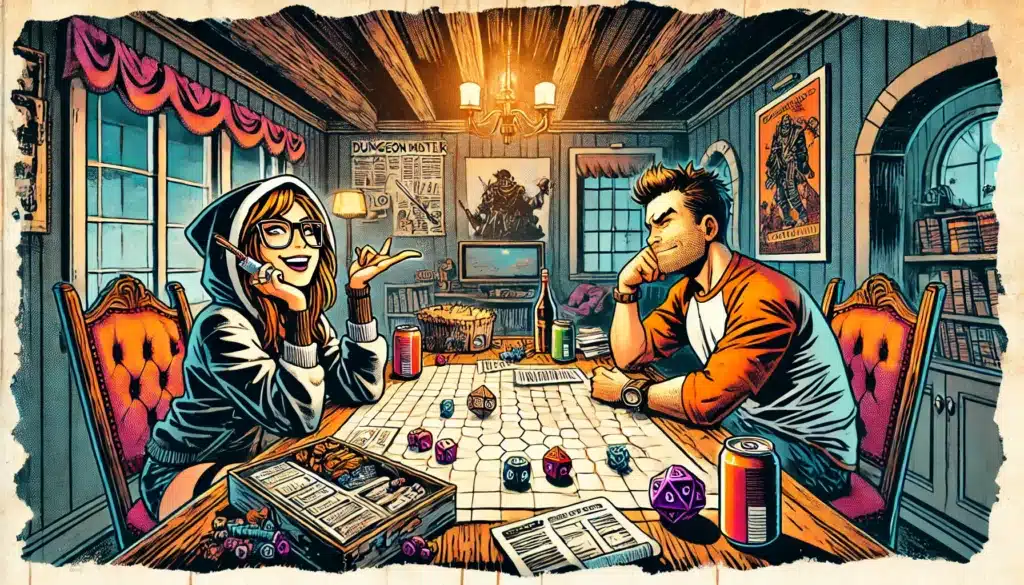
How Players Can Help the DM Keep the Game Running Smoothly
Every Dungeon Master appreciates when players take small actions to smooth the game’s flow. Players need to remember that a collective effort keeps the experience enjoyable for everyone involved. Here’s how players can lend a hand in keeping the game running smoothly.
First and foremost, players should come to the table prepared. This means knowing their character’s abilities and backstories and understanding how they fit into the campaign. Being ready for their turn in combat and knowing what actions they plan to take minimizes downtime. Preparation is the key to a seamless session.
Respecting the DM’s decisions also goes a long way. Players may not always agree with every call, but it’s important to trust the DM’s judgment. Disputes can sideline the storyline and stall progress, dampening the group’s enjoyment. The key is to handle disagreements constructively without breaking the pace.
Another vital aspect is active engagement with the game world. Players should interact with the setting and NPCs, and remain attentive to the unfolding story. Participating actively in roleplay enriches the experience for everyone. This cooperation helps the DM craft a more immersive and cohesive narrative.
⚔️ Fantasy RPG Random Tables Books
Make life as a Gamemaster easier…
If you play Dungeons & Dragons, Pathfinder, or other fantasy RPGs, this
RPG random tables series
is packed with encounters, NPCs, treasure, and more. Available in eBook or print—either way, you’ll have a wealth of adventure ideas at your fingertips.
Finally, acknowledging the DM’s efforts can boost morale and keep the creative juices flowing. Players can show appreciation through small gestures, such as expressing gratitude or providing constructive feedback. This fosters a positive environment where creativity thrives, and the game can reach new heights of fun.
Be Prepared and Pay Attention
A prepared player is a DM’s best ally. When players know their character sheets inside and out, they can make informed decisions quickly, keeping the combat and story flowing. Preparation reduces lag time and allows for more interaction and story development.
One of the simplest actions players can take is to read their character sheets thoroughly. Knowing abilities, spells, and equipment intimately allows for quick decision-making. Additionally, understanding one’s strengths and weaknesses ensures that the player can contribute effectively to every encounter.
Players should also maintain focus during sessions. Distractions can lead to missing key plot points or misunderstandings about the game’s progression. Staying engaged means less repetition and clarifies plans and story arcs, which keeps the session tight and engaging for everyone.
Tracking key metrics such as Hit Points (HP) or spell slots is another important player responsibility. This not only helps the game’s pace but also supports strategic decision-making, allowing players to act decisively and stay immersed in the story.
Bullet List of Preparation Tips:
- Familiarize yourself with your character sheet
- Know your spells and abilities before the session
- Keep important rules handy for quick reference
- Track your HP and resources diligently
- Minimize distractions, like putting phones away
- Be ready when it’s your turn in combat
- Take notes on important plot details
- Ask questions if you don’t understand something
- Stay engaged with other players’ turns
- Discuss strategies outside of game time
- Communicate effectively with other players
- Be open to adapting your playstyle for group dynamics
Preparedness is crucial in keeping sessions as enjoyable as they are efficient. When players come ready and focused, it ensures everyone’s efforts are respected and valued, leading to a richer gaming experience.
Respect the DM’s Decisions and the Flow of the Game
The integrity of any D&D session relies heavily on maintaining the story’s flow. When players respect the DM’s decisions, they allow the narrative to unfold naturally, which is crucial for a cohesive and immersive experience.
Disagreements are bound to arise, be it over rule interpretations or story directions. The key is resolving these amicably without breaking the game’s pace. Players should aim to trust their DM’s judgment, ensuring that any disputes are handled smoothly and respectfully.
To foster this trust, players and DMs can establish ground rules for handling disputes. Instead of prolonged debates, consider noting disagreements and moving on to keep the session moving. Such resolutions can be addressed later without disrupting the game.
A smooth flow of the game also requires players to avoid interrupting the DM’s storytelling. Listening attentively and waiting for appropriate times to voice concerns maintains the narrative’s rhythm and respects the DM’s role as the story’s guide.
Table Listing Common Player Disputes:
| Dispute | DM Perspective | Constructive Resolution |
|---|---|---|
| “That ruling doesn’t make sense!” | Has a reason for decision, balancing game flow | Ask for clarification after the session |
| “My character wouldn’t do that!” | Considers the story’s needs | Discuss character motivations privately with the DM |
| “That encounter is too hard!” | Aims for challenge, not frustration | Provide feedback on difficulty level post-session |
| “Why can’t I do that?” | May have story-related reasons | Request a brief explanation, accept or revisit later |
| “It’s not fair!” | Balancing is a complex task | Discuss fairness concerns in player feedback sessions |
| “I didn’t like that twist.” | Plot twists keep the story dynamic | Express thoughts respectfully, focus on future engagement |
| “Why so much focus on NPCs?” | NPCs add depth to the game world | Engage more with NPCs, offer ideas for player involvement |
| “I want to try something different.” | Encourages creativity within boundaries | Plan new actions during downtime or between sessions |
| “Can I retcon that?” | Continuity is important for immersion | Accept consequences, use them for character growth |
| “I disagree with the ruling.” | Follows rulebooks with DM discretion | Accept DM’s final say, suggest rule review later if necessary |
Trust is pivotal for a successful D&D campaign. When players respect the DM’s decisions and flow, it upholds the narrative structure and fosters an environment where everyone can enjoy the game to its fullest.
Helping the DM Create a Great Story
Players are not merely passive participants in a D&D campaign. They are co-creators of the adventure, capable of enriching the narrative with their actions and decisions. By engaging with the story and contributing creatively, players can help the DM build a world that feels dynamic and alive.
A player’s enthusiasm for the setting and story fuels the session. Rather than just responding to events as they happen, players can take initiative, ask questions, and express curiosity about the world around them. This kind of engagement encourages the DM to explore deeper facets of the story, enriching the narrative for everyone involved.
A great way to contribute is by actively roleplaying with both the DM’s NPCs and fellow players. This interaction can lead to surprising developments and plot twists that might not have occurred otherwise. Collaborative storytelling is what makes tabletop RPGs unique.
Players also have the opportunity to influence the story through their character’s backstory and personal goals. Discussing these aspects with the DM ensures that character arcs receive the attention they deserve, making the story more personal and engaging.
Remembering past plot details and using them to inform decisions keeps the story cohesive and interconnected. It shows the DM that players are invested in and paying attention to the narrative, encouraging deeper lore and more intricate storylines.
Engage with the World and Your Fellow Players
Engagement is the lifeblood of any roleplaying game. When players actively participate, ask questions, and interact with their surroundings, they contribute to a richer, more dynamic story. Communication and collaboration are the keys to unlocking a world of adventure.
Active roleplay is one of the best ways to engage. By embracing their characters’ personalities and motives, players can explore new facets of themselves and the story. Engaging with NPCs and reacting meaningfully to story events adds depth to the campaign and helps weave a compelling narrative.
Try my AI Tabletop RPG generators...and an extensive library of content!
Asking questions about the setting and lore shows that players are invested in the world the DM has created. Curiosity encourages the DM to elaborate on details, painting a vivid picture of the game’s universe. This interactive world-building makes the adventure more immersive and realistic.
Interacting with other players’ characters and playing off their arcs creates a web of relationships and stories that enrich the campaign. These interactions can lead to new plotlines and alliances, shaping the narrative in unexpected ways. Collaboration fosters a sense of teamwork and shared discovery.
Maintaining an awareness of past events and using this knowledge to guide decisions is crucial for a cohesive story. Remembering key plot points and details helps players react authentically to new situations, adding continuity and richness to the narrative.
Bullet List of Ways to Engage with the Story:
- Write a detailed character backstory
- Actively roleplay during sessions
- Ask questions about the setting and lore
- Interact with NPCs meaningfully
- Collaborate on story ideas with the DM
- Play off other players’ arcs and stories
- Remember past plot details for continuity
- Suggest in-game consequences for actions
- Volunteer to initiate story-driven side quests
- Create personal goals for your character
- Build relationships with other characters
- Engage in character development
- Provide feedback on story elements you enjoy
- Encourage new players to explore their characters
- Maintain consistent characterization across sessions
Collaboration is the heart of storytelling in D&D. When players actively participate and engage, they help create a narrative that resonates with everyone at the table. This shared effort turns a good story into a great one.
Keep Things Moving—Don’t Get Stuck on Small Decisions
Pacing is vital for maintaining excitement and engagement in a D&D session. When players get bogged down in minor details or overly complex planning, it can stall the action and detract from the adventure. Here’s how to avoid the pitfalls of decision paralysis and keep things moving.
⚔️ Fantasy RPG Random Tables Books
Make life as a Gamemaster easier…
If you play Dungeons & Dragons, Pathfinder, or other fantasy RPGs, this
RPG random tables series
is packed with encounters, NPCs, treasure, and more. Available in eBook or print—either way, you’ll have a wealth of adventure ideas at your fingertips.
One way to maintain momentum is by setting time limits on planning discussions. This encourages quick thinking and keeps the focus on the bigger picture rather than getting lost in minutiae. Speedy decisions can lead to thrilling moments and unexpected outcomes, enhancing the game’s excitement.
Avoiding excessive tangents in combat situations is another important tactic. While strategic planning is crucial, overanalyzing every possible move can slow the game’s pace to a crawl. Encouraging players to make decisions quickly and adapt on the fly keeps battles dynamic and engaging.
It’s also helpful to prioritize actions based on their impact on the story. Players should focus on decisions that drive the narrative forward, rather than getting caught up in minor details that don’t significantly affect the plot. This prioritization helps maintain a steady rhythm, sustaining immersion and excitement.
Players can also pre-plan their strategies during downtime or between sessions. Having a general plan in mind before the game starts reduces the need for lengthy discussions during play, speeding up the flow of the game.
Bullet List of Ways to Keep the Game Moving:
- Set time limits on planning discussions
- Focus on decisions that drive the story
- Avoid excessive tangents in combat
- Encourage quick decision-making
- Pre-plan strategies outside sessions
- Adapt plans as situations change
- Limit rules debates during the game
- Keep track of mission objectives
- Stay focused on the current goal
- Use character motivations to guide decisions
- Encourage a fast pace in slower moments
- Support the DM in moving past stalled moments
Keeping the game’s pace lively ensures that players remain engaged and invested in the story. When decisions are made swiftly and deliberately, the narrative flows smoothly, offering a richer and more immersive experience for everyone involved.
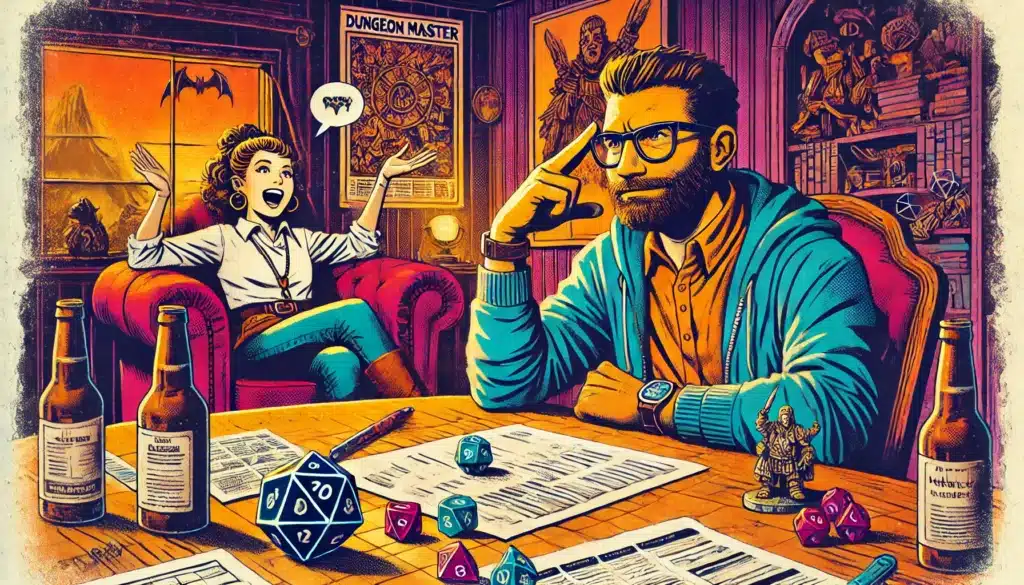
Supporting the DM’s Emotional and Mental Load
Behind every epic campaign is a DM who invests time, creativity, and emotion into crafting a memorable story. But DM burnout is a real concern, and players can play a crucial role in supporting their DM to keep the game sustainable and enjoyable.
Understanding the emotional and mental load a DM carries is essential. A DM not only manages the story and game mechanics but also balances the group’s dynamics and expectations. When players are mindful of this, they can adjust their behavior to alleviate some of this burden.
Showing appreciation for the DM’s efforts is a simple yet powerful way to provide support. Small gestures of gratitude, like thanking the DM after a session or acknowledging their hard work, can make a big difference in morale. It reinforces the DM’s dedication and encourages continued creativity.
Offering constructive feedback is also valuable. Players should aim to provide input that is helpful and encouraging rather than critical. Constructive feedback can help a DM refine their storytelling and game management, leading to a better experience for the group.
Sometimes, the best support is practical help. Assisting with setup, cleanup, or even taking on minor game management tasks can ease the DM’s workload. This collaboration not only benefits the DM but enhances the collective gaming experience.
Show Appreciation and Give Constructive Feedback
Gratitude is a powerful motivator. When players show appreciation for their DM’s hard work and creativity, it boosts morale and fosters a positive gaming environment. Acknowledging the time and effort the DM invests in planning and running sessions is key to maintaining their enthusiasm.
Expressing gratitude can take many forms. A simple thank you at the end of a session, a message between games, or even a small token of appreciation can go a long way. These gestures make the DM feel valued and respected, encouraging them to continue crafting epic adventures.
Constructive feedback is equally important. Players should focus on providing input that is specific, helpful, and positive. Instead of pointing out flaws, they should highlight what they enjoyed and offer suggestions for improvement in a supportive manner. This feedback helps the DM refine their skills and game management.
Encouraging an open feedback loop can enhance communication between the DM and players. Regularly discussing what’s working and what could be improved strengthens the group’s dynamic and ensures everyone’s needs are being met.
Bullet List of Ways to Support a DM Emotionally:
- Thank the DM after each session
- Acknowledge the effort that goes into planning
- Offer to help with session setup or cleanup
- Provide specific, positive feedback
- Encourage constructive discussions
- Be supportive when things don’t go as planned
- Respect the DM’s boundaries and limits
- Avoid demanding too much of their time
- Offer to assist with minor game management tasks
- Suggest ideas for future sessions or stories
- Buy snacks or drinks to share during games
- Reach out between sessions to express appreciation
Creating a supportive and positive environment at the table enhances the game for everyone. When players show appreciation and provide constructive feedback, they help the DM stay motivated and excited about crafting unforgettable adventures.
Avoiding Behaviors That Drive DMs Crazy
Every DM has encountered frustrating player behaviors that can derail a session or disrupt the game’s flow. Awareness of these behaviors allows players to make conscious efforts to avoid them, creating a more harmonious and enjoyable gaming environment.
Some common problematic behaviors include not paying attention, constantly interrupting, or engaging in meta-gaming (using out-of-game knowledge in-game). These actions can frustrate the DM and detract from the group’s collective experience.
Hogging the spotlight is another issue that can cause tension at the table. When one player dominates the session, it can leave others feeling sidelined or undervalued. Sharing the spotlight ensures everyone has a chance to contribute to the story.
Arguing over rules during play is a behavior that can grind a session to a halt. While it’s important to understand the rules, debates should be minimized during sessions to maintain the game’s flow and keep the focus on roleplaying and storytelling.
The “Problem Player” Checklist—And How to Fix It
Identifying and addressing common problem behaviors is essential for maintaining a positive and engaging gaming environment. Here are some behaviors that can drive a DM crazy and how players can correct them.
Table with Common Problem Behaviors:
| Problem Behavior | Why It’s a Problem | Better Alternatives |
|---|---|---|
| Metagaming | Breaks immersion, disrupts roleplay | Focus on character knowledge, separate player and character info |
| Hogging the spotlight | Leaves other players out | Encourage others to participate, take turns highlighting characters |
| Constant Interruptions | Disrupts flow, stalls the story | Wait for the right moment to speak, use hand signals to indicate input |
| Ignoring key plot points | Leads to confusion, derails story | Take notes, ask for clarification when needed |
| Arguing rules mid-session | Slows game, increases tension | Note disagreements, discuss later |
| Overplanning | Stalls action, causes frustration | Set time limits on planning, prioritize decisions |
| Being distracted or disengaged | Causes downtime, impacts group engagement | Minimize distractions, focus on the game |
| Challenging DM’s decisions often | Undermines DM authority, creates tension | Trust DM’s judgment, suggest discussing concerns post-session |
| Unsolicited advice or corrections | Can be seen as undermining the DM | Offer suggestions respectfully, in private if possible |
| Reluctance to participate | Dampens group energy | Engage with the story, seek role-playing opportunities |
| Neglecting character development | Limits story depth, player enjoyment | Invest in character growth, seek relationships within the story |
| Being overly critical | Lowers morale, creates negative atmosphere | Focus on positive feedback, offer constructive criticism tactfully |
Addressing these behaviors can significantly improve the experience for everyone at the table. By being mindful of their actions and striving for a collaborative atmosphere, players can help make each session more enjoyable and engaging.
⚔️ Fantasy RPG Random Tables Books
Make life as a Gamemaster easier…
If you play Dungeons & Dragons, Pathfinder, or other fantasy RPGs, this
RPG random tables series
is packed with encounters, NPCs, treasure, and more. Available in eBook or print—either way, you’ll have a wealth of adventure ideas at your fingertips.
Awareness and communication are key to a successful D&D campaign. Players who recognize and adjust problematic behaviors contribute to a more positive and efficient gaming experience, benefiting both the DM and the group as a whole.
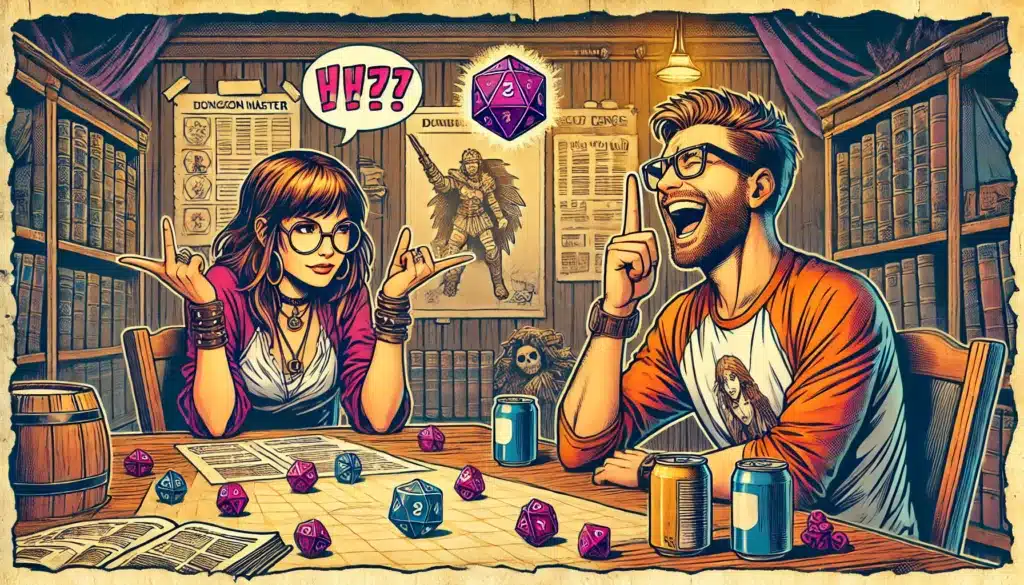
How to Be a DM’s Favorite Player
Every DM has that player—the one they’re always excited to have at their table. This player enhances the game experience, making it more enjoyable and dynamic for everyone. But what does it take to be that player? Let’s explore the qualities that make a player stand out in a good way.
Being a team player is essential. Sharing the spotlight with fellow adventurers, supporting their narratives, and ensuring everyone feels included makes for a balanced and harmonious game. When players lift each other up, the whole table benefits.
Encouraging others to engage and play a part in the story creates a vibrant and interactive environment. Maybe it’s setting up other players for cool moments or making sure quieter players have a chance to shine. These actions foster camaraderie and shared adventure.
Embodying different playstyles with respect and enthusiasm can also elevate the game. By acknowledging that everyone may approach the game differently—whether they focus on roleplay, combat, or strategy—players create an inclusive atmosphere that welcomes diversity.
Taking on small responsibilities, like tracking initiative or helping new players, can ease the DM’s load. When players volunteer for these tasks, it frees the DM to focus more on storytelling and managing the bigger picture.
Be a Team Player and Encourage Others
A game of Dungeons & Dragons is as much about cooperation and teamwork as it is about personal achievement. A player who acts as a supportive teammate enriches the game for everyone involved. Here’s how to embody that spirit of collaboration.
Sharing the spotlight is key to ensuring everyone at the table gets the opportunity to shine. When players take turns speaking, acting, and making decisions, the narrative becomes a shared experience, fostering a sense of unity and teamwork.
Encouraging quiet players to participate can make a huge difference. Sometimes all it takes is a gentle nudge or an open-ended question to draw them into the story, making them feel valued and included in the group dynamic.
Respecting different playstyles is crucial for a harmonious table. Whether fellow players prefer to dive into deep roleplay or focus on strategic combat, embracing these differences creates an inclusive environment where everyone can enjoy the game their way.
Setting up other players for cool moments demonstrates selflessness and camaraderie. Helping others achieve heroic feats or supporting their character arcs strengthens bonds and elevates the group’s overall enjoyment of the story.
Bullet List of Ways to Be a Great Teammate:
- Share the spotlight with everyone at the table
- Encourage quiet players to participate
- Support other players’ narratives
- Respect different playstyles and approaches
- Set up others for cool moments in the story
- Communicate effectively with the group
- Celebrate others’ successes and achievements
- Offer help when fellow players are stuck
- Collaborate on strategies and plans
- Avoid dominating conversations or decisions
- Actively listen to and engage with others’ ideas
- Create an inclusive, welcoming environment
A collaborative team player is invaluable in any D&D game. By fostering cooperation and supporting others, players contribute to a more immersive and enjoyable experience for everyone involved.
Help with the Small Things—They Add Up
In a D&D session, even the smallest acts of assistance can significantly impact the overall game experience. Helping with minor tasks not only eases the DM’s workload but also improves the game’s efficiency and flow.
Tracking initiatives or keeping session notes are simple tasks that can make a big difference. When players take on these responsibilities, it allows the DM to focus on the bigger picture, ensuring a smooth and engaging session.
Organizing loot or managing the party’s inventory is another way players can assist. This task might seem mundane, but it contributes to the group’s strategy and preparation, keeping the game organized and moving efficiently.
Helping new players by explaining rules or game mechanics can enhance their experience. It’s an opportunity to share knowledge and ensure that everyone feels comfortable and confident in their role, leading to a more cohesive group dynamic.
Reminding the group when it’s time to wrap up or take breaks can also help maintain the game’s pace and energy. These small gestures show consideration for the DM’s efforts and the group’s collective time, contributing to a positive session environment.
Bullet List of Minor but Helpful Tasks:
- Track initiatives during combat
- Keep session notes and summaries
- Organize loot and manage inventory
- Help explain rules to new players
- Remind the group of time or breaks
- Assist with game setup and cleanup
- Maintain a player resource library
- Coordinate scheduling and availability
- Ensure everyone has necessary materials
- Share relevant game resources or tools
- Manage a group chat or communication channel
- Facilitate discussions about the campaign
Small contributions can lead to significant improvements in the overall gaming experience. By helping with these minor tasks, players show support for their DM, fostering an atmosphere of mutual respect and cooperation.
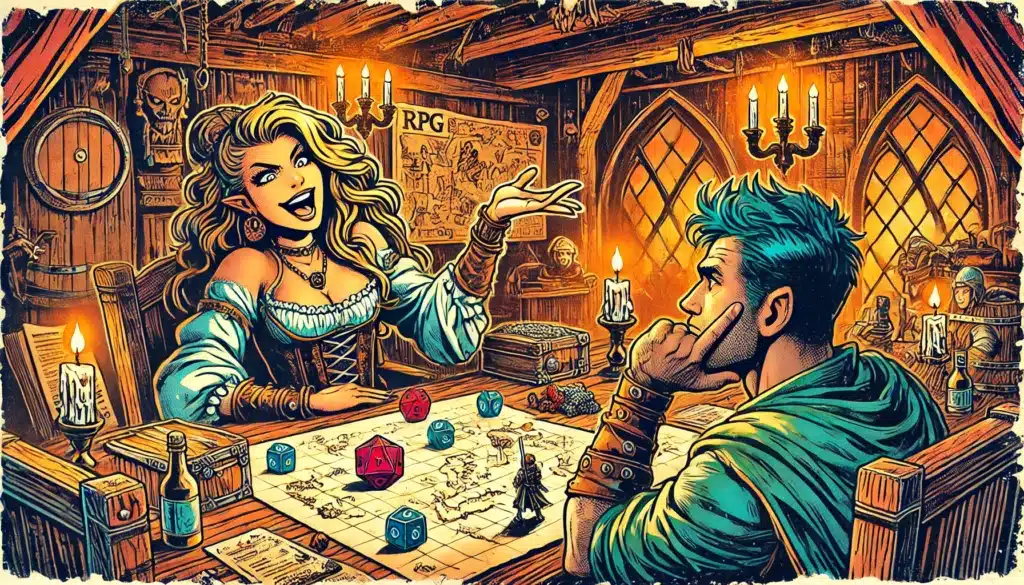
Final Thoughts on Supporting Your DM
The heart of a fantastic Dungeons & Dragons experience lies in the collaboration and mutual respect shared among the players and their Dungeon Master. Supporting the DM is more than just being respectful during gameplay—it’s about embracing the shared journey you embark on together as a table. This collaboration fosters a creative environment where everyone can contribute their unique ideas, enriching the story and enhancing the gaming experience. Players should actively engage with the narrative and offer support to the DM, whether it’s through in-character interactions or by respecting the time and effort that goes into crafting the adventure. For those looking to elevate their role as a DM, seeking out additional resources or tips for dungeon masters can provide valuable insights and techniques to create an unforgettable campaign.
Being proactive in your role as a player means recognizing the tireless effort that goes into every campaign. Acknowledging the DM’s hard work fosters an atmosphere where creativity and storytelling flourish. This appreciation enhances the game for everyone involved.
⚔️ Fantasy RPG Random Tables Books
Make life as a Gamemaster easier…
If you play Dungeons & Dragons, Pathfinder, or other fantasy RPGs, this
RPG random tables series
is packed with encounters, NPCs, treasure, and more. Available in eBook or print—either way, you’ll have a wealth of adventure ideas at your fingertips.
Respecting the game’s flow ensures that the story remains engaging and immersive. Players who trust in the DM’s guidance and support the narrative’s momentum help create a seamless and captivating experience. When everyone works together, the game world feels alive and vibrant.
Engaging with the story in meaningful ways strengthens the narrative, making it more enjoyable for all. Active participation and curiosity reveal new layers within the campaign, offering opportunities for growth and adventure.
Ultimately, a great D&D campaign is not solely the DM’s responsibility, nor is it solely the players’. It’s a shared effort, an epic tale crafted together by everyone at the table. Remember, your actions and attitudes contribute just as much to the adventure as the DM’s intricate plots and characters.
By being mindful of your responsibilities as a player, you help create a fun, supportive, and magical gaming environment. Recognize the importance of teamwork, respect the DM’s efforts, and engage wholeheartedly with the story. Together, you’ll embark on thrilling journeys and create memories that will last a lifetime.

